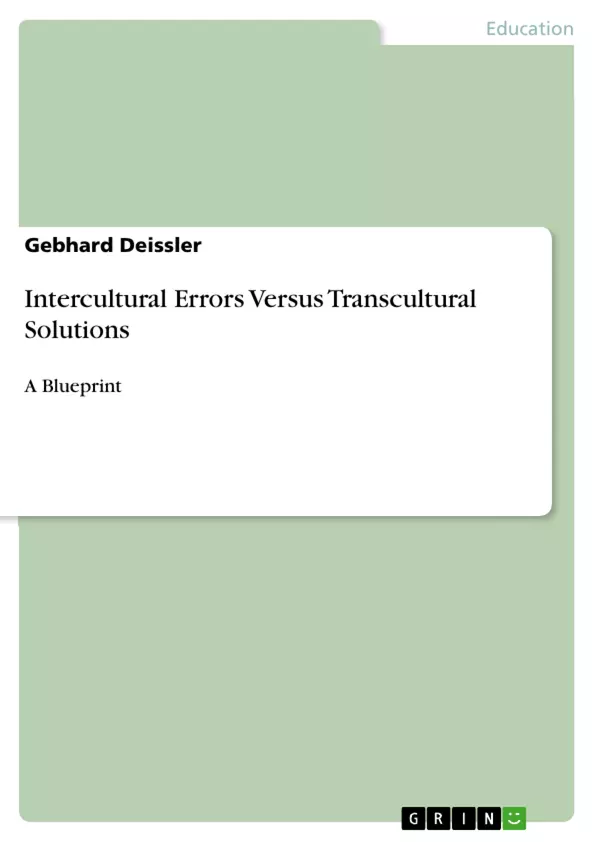The ethnocentric, the cultural/intercultural and the transcultural mindsets respectively create a cultural wave that spreads across and impacts the sea of time and space and thereby those who share that time-space continuum. The ethnocentric perception is not aware of this interconnectedness, while the cultural or intercultural mindset can have variable degrees of awareness of it but cannot transcend the divisionary logic of this perceiver’s creative logic. Only the transculturalist is fully aware of the interconnected field, where the perceiver’s consciousness co-creates the cultural world. Due to his awareness of a culture integrative transcultural dimension of his constitution he can transcend the interculturalists fragmentation of the world by an integrative momentum based on a solid multidimensional scientific axiomatic.
Inhaltsverzeichnis (Table of Contents)
- PROLOGUE
- 1. THE INTERCULTURAL NEMESIS
- 2. THE LOGIC OF PARADIGM SHIFTS
- 3. TRANSCULTURAL MANAGEMENT
- MASTERS' OF CULTURE SUPREME CULTURAL INTELLIGENCE
- THE ARCHITECTURE OF CONSCIOUSNESS AND INTERCULTURAL RESEARCH
- THE DAWN OF AN INTERCULTURAL METASCIENCE
- AN EPISTEMOLOGICAL BLUE PRINT FOR 360° TRANSCULTURAL SYNERGY
- 4. CULTURE, CONSCIOUSNESS AND THE UNIVERSE
- 5. PRAXOLOGY: FROM INTERCULTURALISM TOWARDS TRANSCULTURALISM. A SYNOPSIS OF INTERCULTURAL INTERFACING INSTRUMENTS AND STRATEGIES
- 6. BILINGUAL ENGLISH-GERMAN INTER-AND TRANSCULTURAL MANAGEMENT REFERENCE DICTIONARY
- BIBLIOGRAPHY
- EPILOGUE
Zielsetzung und Themenschwerpunkte (Objectives and Key Themes)
This book presents a blueprint for navigating the complexities of cultural interactions and proposes a shift from interculturalism towards transculturalism. It aims to bridge divides, liberate individuals from conditioning, and foster unity in diversity by promoting a deeper understanding and appreciation of different cultures.
- The limitations of interculturalism and the emergence of a transcultural approach.
- The role of paradigm shifts in understanding and navigating cultural differences.
- The development of a "meta-science" for intercultural research and management.
- The relationship between culture, consciousness, and the universe.
- Practical tools and strategies for transcultural management and communication.
Zusammenfassung der Kapitel (Chapter Summaries)
The book explores the shortcomings of traditional intercultural approaches, highlighting the need for a more holistic perspective that transcends cultural boundaries. It delves into the underlying logic of paradigm shifts and their significance in understanding cultural dynamics. The book then presents a comprehensive framework for transcultural management, emphasizing the importance of cultural intelligence and the development of an "intercultural meta-science." Chapter 4 examines the interconnectedness of culture, consciousness, and the universe, while Chapter 5 provides practical tools and strategies for navigating cultural interfaces.
Schlüsselwörter (Keywords)
The key terms and concepts discussed in the book include interculturalism, transculturalism, paradigm shifts, cultural intelligence, transcultural management, meta-science, intercultural research, cultural interfaces, and cultural diversity.
Frequently Asked Questions
What is the difference between intercultural and transcultural mindsets?
An intercultural mindset often operates within a logic of division, while a transcultural mindset is aware of the interconnectedness of all participants and seeks to transcend cultural boundaries.
What is "Transcultural Management"?
It is an approach to management that uses cultural intelligence and a holistic scientific framework to create synergy and unity in diverse environments.
What role do paradigm shifts play in cultural understanding?
Paradigm shifts are essential for moving away from ethnocentric views toward a fully integrated transcultural perspective on the world and business.
What is the "Intercultural Metascience" mentioned in the book?
It refers to a multidimensional scientific axiomatic that provides an epistemological blueprint for achieving 360° transcultural synergy.
Does the book provide practical tools for managers?
Yes, the book includes a synopsis of intercultural interfacing instruments, strategies, and a bilingual English-German reference dictionary for management.
- Citation du texte
- D.E.A./UNIV. PARIS I Gebhard Deissler (Auteur), 2011, Intercultural Errors Versus Transcultural Solutions, Munich, GRIN Verlag, https://www.grin.com/document/167434



